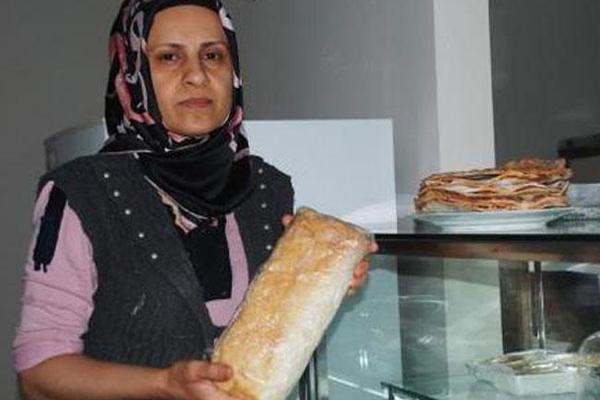Elazığ cafe offers safe haven to celiac patients
Kardelen Koldaş – ELAZIĞ


A gluten-free diet is quite hard to keep up, but thanks to a recently opened cafe in the eastern province of Elazığ, celiac patients who want to dine out with their friends can now maintain their health.
The cafe “Naz’s Gluten-Free Kitchen” is owned by 53-year-old Nazife Kırıkçı. It is a spacious place located in a narrow alley in Elazığ’s city center.
But people of Elazığ are not the only ones visiting the cafe.
“They also come from other cities, Tunceli, Bingöl, Diyarbakır, Malatya,” Kırıkçı told daily Hürriyet, adding that she even receives order calls from the capital Ankara.
Kırıkçı’s journey that led her to open a gluten-free café started seven years ago, when she was diagnosed with celiac disease after going through a major heart surgery.
After the surgery, Kırıkçı’s weight declined to about 37 kilograms. Noticing this visible change, doctors began examining the root cause of the weight loss.
The series of examinations concluded she had celiac disease. Hence, Kırıkçı had to start eating gluten-free. That also meant cooking separate meals for herself, as she was the first and only one with celiac disease in the family.
For example, instead of making stuffed meatballs (içli köfte) with bulgur, a gluten containing product, she began using corn semolina to make it gluten-free. Rather than bulgur pilaf, she started consuming pilaf made by regular rice. She also prepared her pastries with gluten-free flour.
“When I started the diet, I had a really hard time at the beginning because the products we [celiac patients] would have to get, like flour or bread could not be found here. Still, we cannot find most of them,” said Kırıkçı, who orders most of her gluten-free ingredients online.
With a gluten-free diet, she slowly went back to her healthy weight. As she regained her energy, she also resumed her business of selling homemade goods online. But her experience with a gluten-free diet brought along a breath of fresh air; she was inspired to add gluten-free products to her menu, eventually leading up to the idea of a gluten-free cafe. “I can make all the pastries you eat for myself,” said Kırıkçı, who saved up money from her online sales little by little and opened her gluten-free cafe in May.
Kırıkçı’s cafe is open six days a week and besides baked goods, she serves three meals a day. Stuffed meatballs (içli köfte), Turkish pizza (lahmacun) and Turkish dumplings (mantı). All are prepared by Kırıkçı for the gluten-free community.
“When I opened the cafe, my friends with celiac disease were so happy and pleased. They said now we have a cafe too,” Kırıkçı said excitedly.
Because gluten-free products are more costly, Kırıkçı also prepares regular meals along with their gluten-free counterparts. This way, she thought families could have a meal together without hurting their budget. To avoid cross contamination, Kırıkçı has separate kitchens, cooking utensils and freezers for products with and without gluten.
For celiac patients, eating out can be a nightmare since businesses may not know how to cater to their special needs. Due to this issue, the first thing people want to know when visiting Kırıkçı’s cafe is to learn if there is anyone with celiac disease.
According to Kırıkçı, this is a way of establishing trust between the customer and the cafe. While her business offers a safe haven to celiac patients, Kırıkçı herself is still deprived of eating out due to the low number of gluten-free restaurants in Turkey and low level of self-awareness regarding this issue.
Kırıkçı wishes for more people to become conscious of gluten-free eating so she can also eat out without a worry.
“I miss eating and having fun with my friends in a cafe,” she said.
0.09 percent of population are celiac
According to the Health Ministry, in 2015, 67,683 people obtained a medical report for celiac disease. This number corresponds to 0.09 percent of the total Turkish population.
Diyarbakır, a city in southeastern Anatolia, has the highest percentage of population diagnosed with celiac disease across the country with 0.24 percent.
In Elazığ, where Kırıkçı lives, the number is 0.07 percent.
“In Turkey, celiac disease diagnosis rate ranges from one in 100 to three in a 1,000 people. Therefore, it is predicted there are between 250,000 to 750,000 people with celiac disease in Turkey,” the Health Ministry website states, while emphasizing only 10 percent of the patients have been diagnosed.
